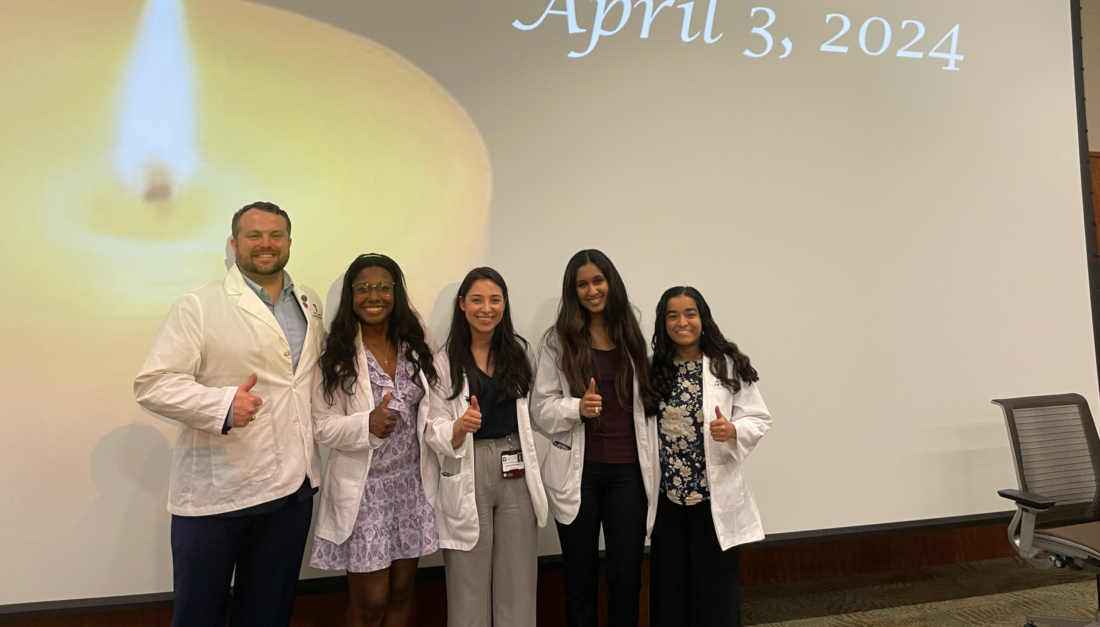Rural Health Rotation Concludes Successful First Year

A new, year-long rotation provides healthcare to special-needs families and early clinical experience to students in the town of Holland, Texas.
With the help of many faculty members, one independent school district and more than a dozen medical student volunteers, the Texas A&M Health Science Center (TAMHSC) College of Medicine instituted a rural health rotation for first-year medical students this academic year.
The idea is simple: match first-year medical students who need clinical experience with families in rural areas who might not otherwise have access to basic medical care. But where to start?
With a grant for an outreach program to rural communities, Catherine McNeal, M.D., Ph.D., Associate Professor of Internal Medicine at the TAMHSC College of Medicine’s Temple Campus, solicited several nearby communities. Cynthia Gunn, Superintendent of Holland ISD, stepped up and offered her school for a new kind of pilot program.
Together they identified five families in Holland, Texas (population 1,100) near Temple with special healthcare needs. For instance, in one blended family, a grandmother with guardianship over her adopted grandchildren came into the program with questions and a few misconceptions about eligibility for healthcare coverage.

Under the guidance of Ruth Bush, M.D., M.P.H., Associate Dean for Education at the TAMHSC College of Medicine Temple Campus and Professor of Surgery, and Dr. McNeal, 15 medical students began meeting monthly with each family in groups of two or three at the Holland elementary school in the fall of 2010.
They were joined by faculty members and mentors including a geriatrician, internist, internal medicine hospitalist, hospital chaplain, pediatrician, the Holland school nurse and a pediatric social worker with more than 35 years of experience.
Throughout the following months, the medical students interacted with the families on many different levels, and both the students and the families benefited from the mentors’ knowledge.
Upon entering the program, families filled out a family history form including a list of their medications. Then the medical students reviewed the histories, asked questions and interacted with the children. The faculty and mentors met regularly with the medical students for debriefings to discuss what took place and introduce new topics and ways to talk to the families.
“To have this experience as a first-year medical student is a privilege, and I appreciate the opportunity to spend time outside of the school library to practice communication skills and problem-solving strategies,” said first-year medical student Alison La. “I appreciate the trust that ‘our’ families have for us, regardless of the fact that we are first-year students.”

“The families’ stories are just incredible,” said Dr. Bush. “By simply meeting with families, we are answering their questions, developing treatment plans and breaking down the barriers to care.”
All agreed that the relationship between students and the townspeople is mutually beneficial and has even provided extra opportunities for the students to serve. When students and faculty made a special trip to serve a turkey dinner during the Thanksgiving holiday, their efforts garnered space in the local newspaper.
“The rural health rotation truly aligns with the [TAMHSC] College of Medicine’s goal of serving the rural areas of Texas,” says La. “Meeting families and working with them on a long-term basis is very practical, and it prepares us for our future careers as medical professionals.”
Ultimately, the TAMHSC College of Medicine hopes to make this rural rotation part of the longitudinal curriculum, allowing students to continue shadowing “their” families throughout all four years of medical school. Dr. Bush and Dr. McNeal hope to expand the program to other nearby communities like Rogers and Bartlett, and the college is also working to integrate the rural health rotation’s best practices into its professionalism courses for all medical students.
Media contact: media@tamu.edu


